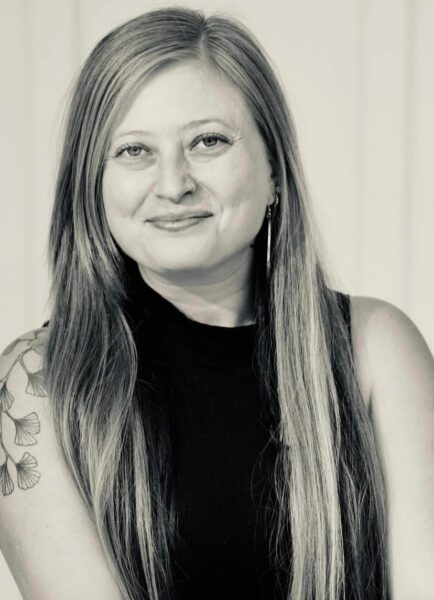I’m curious about the distance imposed by the third-person point of view in the title of this story, given that the story is written in first person. Would you talk about why you chose this wording and not, say, “Woman Like My Grandmother”?
There are two reasons for this. The most pressing is the least satisfying, which is to say: “her” sounded right to my ear. The second reason has to do with positioning the reader. The reader automatically assumes the position of the narrator, and yet the title pushes them into the position of Marie looking at the narrator, or perhaps the mother refusing to look at the narrator. I thought this made for an interesting reversal, possibly an uncomfortable one. You’re invited into the story because of the intimacy of the first-person narration, but also signaled from the very beginning that you are firmly outside of it.
I love the tiny (and musical) lists in this piece: “flat sheets with tight tucked corners, something with stars, sextant navigation” and “I have a cat. And a handful of air plants. And a small house in a small town in northern Arizona” and “Two lovers. Two women. The Pacific. All that salt water, the stars, their bodies. Ours,” and so on. If you had to sum up in a tiny list what you strive for in a tiny story, what would that list be?
Such a good question. And yes, I’m a bit obsessed with lists, I think. Not just in writing, but in life. I’m always making lists of things to organize my mind and my days. For a tiny story, I think I would say: sensory experience, place, character, conflict, and ellipses. A good tiny story ends in ellipses in my opinion. Or at least that’s my opinion right now, in this week of writing. Ask me next week, and I’ll think something entirely different.
The grandmother in this story sails across the ocean, drives across country. Have you done either? Both? If not, would you like to? And what would you cram into your vehicle/vessel? What, if anything, would you rope to the roof?
I have driven across the country, yes. With my family at thirteen in an RV and twice to Indiana to move there. That’s a long story involving a terrible relationship with a man, but needless to say, I mostly regretted both moves. I would love to sail across some sea somewhere. I would bring with me lots of books of course and my cat, Sierra. Also, my endless collection of houseplants and my growing collection of favorite coffee mugs. I have very specific mugs I like to drink from for different purposes. I don’t know why. Small mugs for coffee, large ones for tea. Sentimental mugs like the one my brother gave me with a wraparound picture of my new nephew. Roped to my roof would be—if I’m dreaming here—a surfboard. I haven’t surfed much at all, but I’d like to, and hopefully I’d be driving somewhere coastal and surfable.
Is this story a part of a larger project you’re working on or is it a break from those projects?
Yes and no. This story is part of an ongoing attempt to write about my grandmother, who, in fact, did drive cross country with antlers roped to her roof, and she was a naval officer in World War II. I never met her—she died of breast cancer when my mother was twenty-one—but she holds some power over my family and over me all the same. Grandma Ethel’s legacy. She told stories and my mother retold them to me. She was moody, an alcoholic. She raised six children on welfare. I am in the process of writing a novel that fictionalizes her legacy through the lens of a young woman who has coincidentally just moved across the country to Indiana. The novel is part autofictional bildungsroman, part unconventional family saga, and it centers issues of mental illness from a deeply interior perspective.
On the other hand, “Woman Like Her Grandmother” is something completely on its own. I recently started writing flash fiction again for the first time since I was an undergrad. I just finished up a book of nonfiction and I wanted to get back into writing fiction. I’m in the reading year of my PhD program—trying to read 120 books in about nine months—and working on longer projects feels more draining than anything. There’s something about flash that is freeing and rather fun right now. I still am working on longer projects like the novel, but I can dip in and out of the flash fiction world too, complete a draft of something in one sitting sometimes, and that feels really nice.
You’re so busy—involved in behind-the-scenes work for three literary magazines and a press, not to mention working on your PhD. What impact does all this have on your writing?
Oh, it impacts it for sure. Time is so precious these days. I’m also teaching two classes this semester at the University of Utah through my PhD. I find all of these facets of the writing world to be both time-consuming and rewarding in their own ways. I just make sure to carve out time in the mornings to write. I have an accountability system with a few colleagues where I have to turn in pages to them every week. That helps. And it’s inspiring to read what’s out there in the world. To help a student with a work-in-progress or to publish or champion work that I love. It makes me want to write.



 The SmokeLong Grand Micro Contest (The Mikey) is now an annual competition celebrating and compensating the best micro fiction and nonfiction online.
The SmokeLong Grand Micro Contest (The Mikey) is now an annual competition celebrating and compensating the best micro fiction and nonfiction online.